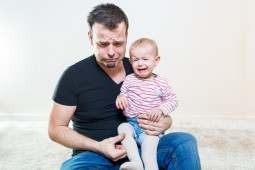The Importance of A Father's Role In The Modern World

Today, fathers may be expected to parent and help with home responsibilities on an equal footing with their spouses. A study of married men and women who had recently had their first child found that having a healthy partnership and attempting to lessen their wife's stress resulted in lower irritation for both couples, even when their infant was fussy. Within the family, dads can play a variety of functions, including:
- Contributing financially toward family goals
- Helping their partners in raising kids
- Sharing equal responsibilities
- Exchanging roles when required
- Even after a split or divorce, they partner in healthy relationships
- Assisting kids with their homework
Why Is Having a Father Important?
A father figure may considerably impact their child's life and well-being. In households where a father figure is present, the father is one of the child's earliest male role models and male interactions.
Children are compassionate and discerning individuals who assimilate relational experiences. These early encounters with their father serve as a template for a relationship with a man, and they influence both the father-son and father-daughter relationships. This suggests that harmful interactions with a father figure can substantially influence not just the child's psychological well-being but also their unconscious relational choices as adults.
A child with a solid relationship with their father has stronger self-esteem, confidence, and more stable relationships with males. Suppose kids have an unpleasant relationship with their father. In that case, they may have more psychological pain as adults and struggle to build good relationships with males.
Keep in mind that changing the internalized relationship pattern that children develop when they are very young is pretty challenging. While it is feasible, it frequently requires extensive psychotherapy intervention and high levels of awareness to modify these deeply ingrained, sometimes unconscious mental processes.
The Modern Father's Changing Role
Over the last few decades, the concept of the "engaged father" has taken hold. Historically, men's identities were highly related to their jobs. This is still partially true today, with around 76 percent of males expressing financial pressure to provide for their families. Men are taking a more active part in parenting than ever before. Yet, more than half of Americans believe that moms are better carers than fathers.
As of 2016, 7 percent of fathers reported being stay-at-home fathers, with 24 percent citing their primary reason as caring for their kids or children. Forty-nine percent of males feel obligated to be engaged fathers. According to research on 49 percent of individuals, men suffer more pressure when returning to work after having a kid. Sixty-three percent of fathers believe they do not spend enough time with their children.
There is a common notion that women are better caregivers than men when it comes to child-rearing, with only 1% believing that men are better caregivers than women. Even if males are more active in parenting, Americans hold certain deeply ingrained preconceptions about men and women and their roles in a family with a husband, wife, and child.
Top 10 Father Responsibilities
In terms of good parenting, the father's obligations may include:
- Modeling good interpersonal relationships with the other caregiver (if applicable) and other adults
- Being compassionate, nurturing, and authentic in your connection with your kid in the absence of distractions
- Healthy ways of expressing affection
- Taking care of oneself physically and psychologically, as well as demonstrating acceptable conduct when assistance is required
- Being patient and forgiving
- Do not impose or project your ideas upon your child.
- Allowing your child to be themselves
- Acceptance and compassion are offered.
- Teaching and modeling proper conflict resolution skills, as well as healthy communication skills
- Setting adequate limits and enforcing appropriate discipline (no violence, no spanking, no yelling, no withholding affection, and no prolonged punishment)
- On a city bus, a father and his children
Trading of responsibilities
Keep in mind that a mother-and-father household is not the only sort of family in which a father figure is involved in many healthy ways. Nowadays, fathers and mothers share the task of child upbringing. Specific duties will vary widely based on the demands of each family. However, in a healthy family, both parents should be adaptable and capable of filling the same duties while supporting one other as parents and spouses.
Depending on the family structure, moms and dads may trade off obligations or devise a balanced method of dividing responsibilities. Regarding parenting, the mother and father should ideally have healthy connections with their kids and be equally active in child-rearing.
The father figure significantly impacts their child's or children's mental and physical well-being. The quality of the parent-child connection is more essential than whether the kid and father are blood-related, regardless of how the father figure is connected to the child or what word for dad they call this parent by.
Fathers and daughters
Young girls are emotionally reliant on their fathers for support and physical stability. A father demonstrates to his daughter the benefits of having a healthy relationship with a man. If a father is compassionate and caring, his daughter will seek such traits in men when she is old enough to start dating. If a father is powerful and heroic, his daughter will be drawn to like such guys.
Fathers and sons
In contrast to females, who model their relationships with others after their father's character, boys take their cues from their father's behavior. Boys will want the approval of their fathers from an early age. We grow up as humans by emulating the conduct of others around us; this is how we learn to operate in the world. If a father is kind and respectful to others, his son will be similarly raised. When a father is not around, young boys seek other masculine models to establish "rules" for acting and surviving in the world.
Fathers' role in emotional development
Fathers, like mothers, are crucial in their children's emotional growth. Fathers are relied upon by their children to lay down and enforce ground rules. They look to their fathers for mental and physical support as well. Children want to please their fathers, and a loving father promotes his children's personal development. According to a study, fathers show their children love and support, and their cognitive and social development is dramatically impacted. It also boosts one's sense of self-worth and well-being.
Conclusion
Anyone may father a kid, but it takes a lifetime to be a father. Fathers occupy a role in every child's life that no one else can. This job may significantly influence a child's development and help form them into the person they become. ParentalMastery.com values all fathers worldwide and is motivated by their contributions to our families.
This content was created by AI



